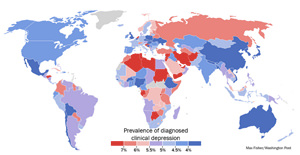Where Does Depression Hurt? A Map of World Clinical Diagnoses
The second leading cause of disability, clinical depression is a widespread disorder. A new study shows the rates at which each country suffers depression and speculates as to the reasons why, for example, Afghanistan has the most incidences of depression while Japan has the fewest.
The second leading cause of disability, clinical depression is a widespread disorder. About 4 percent of the world has been diagnosed with clinical depression, a statistic that has led researchers at Australia’s University of Queensland to explore the rates at which each country is affected. Although the study isn’t comprehensive in that it uses only pre-existing data based on percentages of the population diagnosed with the mental health disorder, it is still a telling measure of the stark differences between regions when it comes to clinical depression.
The Washington Post discusses some of the issues the researchers faced as well as their speculations based on the results published in the journal PLOS Medicine:
People who live in countries with greater awareness of and easier access to mental health services, then, are naturally going to be diagnosed at a higher rate. That may help explain the unusually low rate in Iraq, for example, where public health services are poor. Taboos against mental health disorders may also drive down diagnosis rates, for example in East Asia, artificially lowering the study’s measure of clinical depression’s prevalence in that region. The paper further cautions that reliable depression surveys don’t even exist for some low-income countries — a common issue with global studies — forcing the researchers to come up with their own estimates based on statistical regression models.
Still, the researchers’ findings have real ramifications for the world — and are often surprising. More than 5 percent of the population suffers from depression in the Middle East, North Africa, sub-Saharan Africa, Eastern Europe and the Caribbean. Meanwhile, depression is reportedly lowest in East Asia, followed by Australia/New Zealand and Southeast Asia….
The researchers also quantified the national “burden” of depression using a metric called DALY — disability-adjusted life years, or the number of healthy years a person loses because of depression or a depression-related premature death. Predictably, depression burdens for the most part follow depression rates. The burden is highest in Afghanistan and in Middle Eastern and North African countries, as well as in Eritrea, Rwanda, Botswana, Gabon, Croatia, the Netherlands (!) and Honduras. It’s lowest in Asia’s most prosperous economies, including Japan.
See some patterns here? The researchers did, too. While they can’t conclusively explain why depression is so much more prevalent and damaging in some countries than in others, they have a few theories. Those include conflict, which pushes depression rates up, and the presence of other serious epidemics, which makes depression less of a social burden relative to other public health issues. Notably, Afghanistan, Honduras and the Palestinian territories are the three most-depressed areas researchers looked at.
“In the case of North Africa/Middle East, conflict in the region increased the prevalence of [depression], leading to a higher burden ranking,” they write. In sub-Saharan Africa, on the other hand, diseases such as malaria and AIDS have crowded out depression as a top public health risk. It’s still a very big deal, in other words, but HIV is responsible for far more lost-healthy-years than depression.
Incidences of depression have increased by about a third in the last few decades, prompting Washington Post reporter Caitlin Dewey to insist there is a need to prioritize “low-cost depression interventions” on both a national and global scale. And yet, Dewey depressingly states, due to high costs and social stigma involved in diagnosing mental health disorders, “that type of action seems many years away.”
—Posted by Natasha Hakimi
Your support matters…Independent journalism is under threat and overshadowed by heavily funded mainstream media.
You can help level the playing field. Become a member.
Your tax-deductible contribution keeps us digging beneath the headlines to give you thought-provoking, investigative reporting and analysis that unearths what's really happening- without compromise.
Give today to support our courageous, independent journalists.






You need to be a supporter to comment.
There are currently no responses to this article.
Be the first to respond.